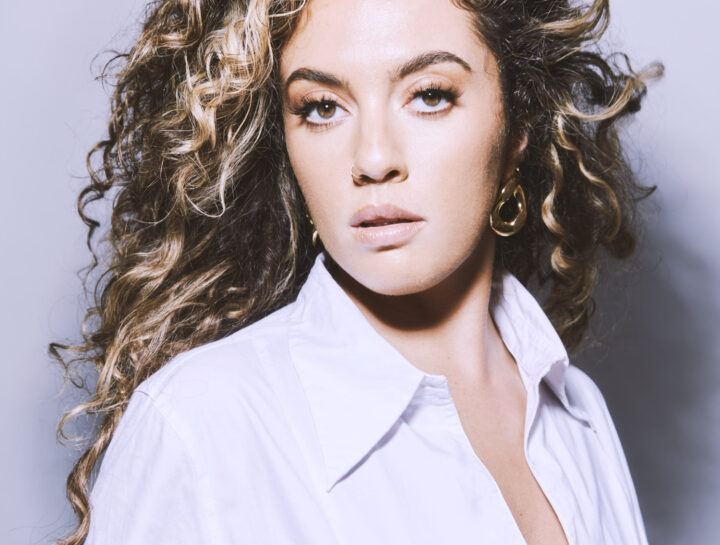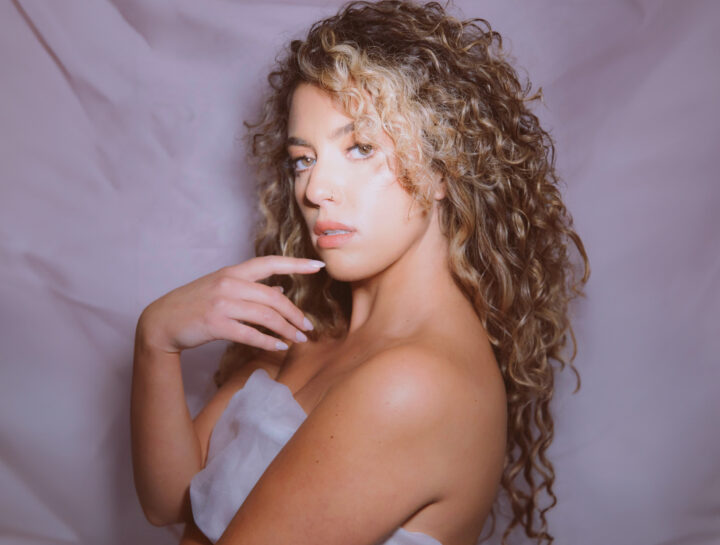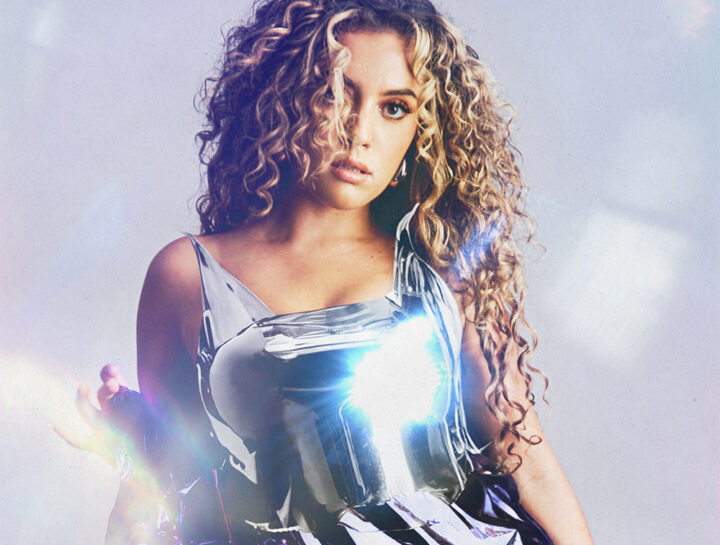Eloise Viola
London-based singer, songwriter and vocal powerhouse Eloise Viola makes music for the head, the heart and the feet.
A proponent of pop's best sub-genre – AKA Crying on the Dancefloor – Viola's songs share messages of self-love, self-empowerment and hard-won strength. It's all there in breakthrough single Electricity, which received strong support from Radio 2 last year and opens her excellent debut album, Glasshouse.
Written and created in LA, Nashville and London, its thirteen songs – influenced by the likes of Robyn, Griff, Becky Hill and Holly Humberstone – chart Eloise Viola's journey from battles with body issues, mental health and loss of confidence, through to the strong, powerful 28-year-old woman keen to pass on what she's learned along the way.
Completely independent and self-funded, Viola's achievements to date have also included a European support slot with Anastacia, millions of streams across a handful of singles and EPs to date, and a growing fanbase hooked on her uplifting music and unforgettable live shows. But it's with Glasshouse that you see the true Eloise Viola, both as an artist and as a person. “I really know who I am now,” she says. “I'm not afraid to say no to things; I'm really business minded and the messaging in my songs is clear. What I've been through just means I have more interesting things to write about.”
Viola's journey to this point has been long and winding. She grew up in the small village of Horsted Keynes in Sussex, in a house reverberating to the sounds of Bob Dylan, Van Morrison and Janis Joplin. While not exactly connected to the rip-roaring dance-pop Viola makes now, this musical grounding did have an impact: “They all have such unique voices so you know instantly who is singing, and that's had an influence on me. I've always wanted to have that.”
Early dabbles in music weren't hugely successful, however, with piano lessons curtailed because they were too regimented - “I just didn't listen, I hated it” she remembers – and school singing lessons initially dismissed because of a focus on show tunes. “I was like 'I want to sing Rihanna, I hate this!'. I was lucky that my school brought in a proper singing teacher. He was this amazing heavy metal singer. He noticed something in me.” While there had been a focus on sheet music and doing things the 'proper way', this rock God had a different, more freeing attitude. “He'd just get up the guitar tabs and the chords and just play whatever song I wanted to sing. I didn't realise you could do that. I was at a strict school and this felt like the opposite. I taught myself how to play the piano after that.”
Another breakthrough came with the release of Adele's 21 album in 2011. Its lyrical specificity had a huge impact on the then 17-year-old Viola. “It was the first time I'd identified songwriting,” she explains. “Before that, songs were just there, they'd appear, but I'd never thought about the mechanics behind it. Then I taught myself how to play that album on the piano, and that's when the songwriting came.” By this point, Viola's parents were encouraging her to pursue singing as a career, even suggesting she perform mini concerts to guests at their dinner parties. There was just one snag: “Even though I'm not a shy person, and never have been, my parents couldn't get me to sing. It's terrible, but once I had another glass of wine I was like 'right, I'm ready to sing now!'. Me playing the piano made me feel less embarrassed to sing.”
While song composition came quite easily, it was the lyric-writing that was causing issues. Dampening her gregarious, energetic spirit in an attempt to replicate the piano ballads that had been such a breakthrough for her simply wasn't adding up. Just out of university and having started a graduate job, music was starting to take a backseat. “A month into doing that job I was like 'this is not what I want to do',” she explains. “So I gave myself a year to pursue the music.”
Having previously been recommended to legendary voice coach Stevie Lange, it was via Lange that Viola was put in contact with a Grammy-nominated American producer who, impressed with her voice, suggested she fly out to LA to work with his team. “They taught me how to write. I'd wanted to write these big Adele-type songs and they suggested my voice was better suited to dance-pop and more uplifting lyrics. Initially I wasn't sure, but we worked on these songs and I ended up loving them. I'm so glad I'm not doing singer-songwriter-y ballads. I have an energy for pop. I'm not an introverted person. I'm not quiet. That's where the dance-pop stuff happened.”
It became clear to Viola that her music worked best when she spoke from the heart, imbuing vulnerability with strength. She's as honest in person about the darker times as she is on record. “I'd had difficulties with eating and control around eating, and obsessive calorie counting, and that had come to a head at University,” she explains. “I'd had some counselling and it was weird that it took a couple of years but I was writing these songs, while also having these counselling sessions, and at one point I was like 'I'm telling everyone I know about these self-love lessons, so why am I not writing songs about them?'. I've honed my messaging now so solidly. I want all of my music to be about self-love and empowerment, and all the facets of that.”
She's honest, too, about the business-side of the industry. That early trip to LA, with all the glamour that goes with it, came with conversations around signing with a label. In the end, that talk came to nothing and Viola quickly realised she'd be better off going down the bumpier, but ultimately more fulfilling, independent route. “A label deal would have been amazing, but it would have been way too soon,” she says. “Being independent means that decisions that have been made have been made by me. If I want to do something out of the box then I can and that is rewarding.”
That means that Glasshouse will also be accompanied by a podcast, allowing Viola the chance to explore the themes on the album away from the short, sharp shock of social media platforms that favour short form content. “Obviously the biggest challenge with being independent is money. I'm totally self-funded. I have another job that I do three days a week. I've made the decision to talk about it, because my whole thing is honesty. A few years ago I thought I was getting too old for this industry and I had this weird belief that I had to get it done by the time I was 30, but I feel so differently about it now. I now feel like my age works in my favour.”
That focus on honesty permeates the songs themselves. It's there on 'Listen', which reflects on the decision to listen to her own instincts over a joyful electro-pop bounce. 'Listen' was released in April 2023 and spearheaded the idea of an album, following the huge success of ‘Electricity’, which took off, both in the UK and also in Latin America where a radio plugger had become a huge fan.
“Electricity is about the feeling of self-fulfilment. You know that expression, 'you can't fill from an empty cup?' This is about feeling fulfilled in yourself so you're able to love other people. You can't love someone until you love yourself. It's about that. It's such a fun song as well.” The song found another fan in Rylan, who supported it on his Radio 2 show.
As the album began to take shape Viola found the songs started to build a story which followed a journey of her own personal healing. Songs like the bluesy '999', 'Delicate' and 'Lifetime' showcase some of the darker sides of that journey. “You can't have the ups without the downs,” she says. “The empowerment only works if you have the context, so Lifetime is that. It's about telling the story. I guess back then I did need saving,” she says of one of the song's key lyrics, “but I don't anymore.”
The featherlight, Robyn-esque 'Delicate', meanwhile, holds a special place in Viola's heart. Written during a writing trip to LA and Nashville in late 2022, at a particularly low point, it helped her see sense. “I was in such a low place with my writing and my career, like I've been doing this for so long and it's cost so much money, is it worth it? At what point is resilience just stupidity? But I went out and I wrote these songs that I felt like I had a greater steer on. I came back feeling rejuvenated. I realised I had something to say and I'd listen back to the songs and think 'yes, this is really fucking good'.”
'Delicate' bloomed from those sessions. “My favourite bit is the lyric “I read somewhere that if you're tired of London, you're tired of life”, and that's how I felt at the time,” she sighs. “That song is so important to me because its creation inspired me to keep going. It's a message to myself. I know what I'm like – when something bad happens I just retreat immediately, and now because I know myself so well, I can now see that happening and it's a reminder that you have to tell people when you're feeling delicate.”
The disco-y title track, meanwhile, tackles her issues with disordered eating and was inspired by a specific article celebrating the return of heroin chic, a 90s fashion trend that seemed to celebrate painfully skinny bodies. “It started off as me talking directly to the author of that article like “'who do you think you are saying what is and what is not “in” about my body? What you have written has made me feel shit”. Everyone thought it was such an unusual image and name for a song. It felt like such a metaphor for the album – the transparency and vulnerability. Glass is strong and see through, but can also be fragile. The house is this idea that your mind and your body are your home and you need to treat it kindly, and delicately.” There's more vulnerability on the tactile synth-pop of 'Easy', co-written with Pam Sheyne, who wrote Christina Aguilera's classic, 'Genie in a Bottle'. “Going to go easy on myself” run the lyrics of the chorus, which becomes a soothing balm for both Viola and her listeners.
There's one particular audience that seems to have latched onto her stories of overcoming adversity and working hard for self-acceptance. “I don't know a single gay person who can say 'I've loved myself from day one',” she says passionately. “There's always a conflict within themselves and they've had to pick themselves up. The LGBTQ+ community has been historically persecuted, and even if it's not to that extent it's a feeling of bias. I don't want my music to pull them out of dark times; I want my music to empower them to pull themselves out of it.” It's an audience she's performed to directly via a handful of Pride events, as well as on last year's Anastacia tour, which saw her performing to 3,000 people each night across Germany and the UK. “I feel so confident in my performance now,” she states. “It's taken five years to get there, but I'm there now. I'm so proud of that.”
Viola is keen to grip everything that comes from releasing Glasshouse – more live shows, more fans, more music – with two hands, and to keep pushing the fact that music can heal anyone and everyone. “I'd like to be knocking on doors and have more of them open,” she says of her ambitions for the next few years. You wouldn’t bet against these doors flying open over the coming months with the release of Glasshouse.


